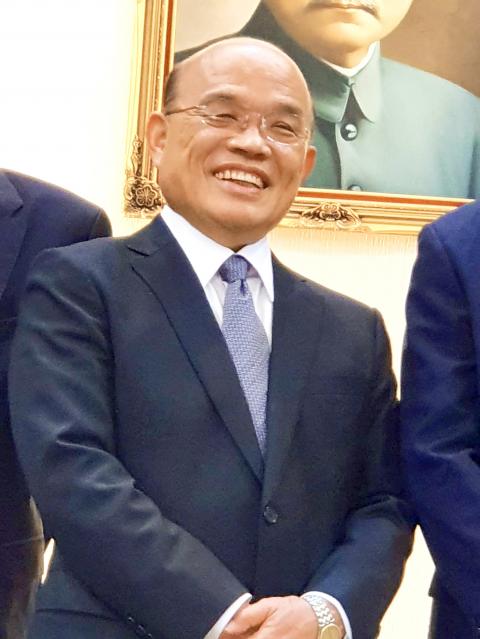Premier Su Tseng-chang (蘇貞昌) yesterday approved three plans proposed by the Ministry of Economic Affairs aimed at attracting an estimated NT$1.175 trillion (US$37.7 billion) of investment and 104,000 job opportunities over three years.
To encourage overseas Taiwanese to invest in Taiwan the government implemented the Action Plan for Welcoming Overseas Taiwanese Businesses to Return to Invest in Taiwan, which was funded by the National Development Fund.
However, due to the popularity of the scheme, the NT$20 billion allocated to the action plan has already been exhausted.

Photo: Li Hsin-fang, Taipei Times
As a result, a second edition of the plan, or Action Plan for Welcoming Overseas Taiwanese Businesses to Return to Invest in Taiwan 2.0, one of the three plans approved, was drafted.
The new plan promises an additional NT$500 billion in subsidies to overseas businesses returning to invest in Taiwan.
Under the new plan, the government is to subsidize 0.5 percent of the processing fees for businesses borrowing less than NT$2 billion, 0.3 percent for businesses borrowing NT$2 billion to NT$10 billion, and 0.1 percent for businesses borrowing more than NT$10 billion.
The loans must be repaid in five years, down from 10 years under the original plan.
The subsidies are to become available after the regulations have been confirmed, Deputy Minister of Economic Affairs Wang Mei-hua (王美花) said.
Meanwhile, the other two plans approved seek to extend the benefits to large businesses that have remained in Taiwan, as well as small and medium-sized enterprises.
Subsidies for the former group would be given according to the same rules that apply to overseas businesses returning to invest in Taiwan, while the latter would get a 1.5 percent subsidy.
The two groups are to be offered NT$80 billion and NT$20 billion in subsidies respectively.
The two plans are to take effect on July 1, Wang said.
The three plans would benefit not only businesses returning from abroad to invest in Taiwan, but also large enterprises that have never invested in China and small and medium-sized enterprises, Su said at a Cabinet meeting.
In addition to the subsidies, all three plans also have dedicated points of contact to help businesses secure land, water and electricity, and handle taxes, he said.
The government wants to show the corporate world and the public that it is determined to boost the economy, Su said.
It wants to demonstrate its effectiveness in reviewing applications, its flexibility in implementing plans and that it can “keep up with trends” and make adjustments as needed, he said.
The Cabinet on May 31 raised the foreign worker quota from 10 percent to 15 percent for multiple businesses, including Accton Technology Corp (智邦科技), the first company to be approved under the original action plan.
Additional reporting by CNA

Taiwan is projected to lose a working-age population of about 6.67 million people in two waves of retirement in the coming years, as the nation confronts accelerating demographic decline and a shortage of younger workers to take their place, the Ministry of the Interior said. Taiwan experienced its largest baby boom between 1958 and 1966, when the population grew by 3.78 million, followed by a second surge of 2.89 million between 1976 and 1982, ministry data showed. In 2023, the first of those baby boom generations — those born in the late 1950s and early 1960s — began to enter retirement, triggering

One of two tropical depressions that formed off Taiwan yesterday morning could turn into a moderate typhoon by the weekend, the Central Weather Administration (CWA) said yesterday. Tropical Depression No. 21 formed at 8am about 1,850km off the southeast coast, CWA forecaster Lee Meng-hsuan (李孟軒) said. The weather system is expected to move northwest as it builds momentum, possibly intensifying this weekend into a typhoon, which would be called Mitag, Lee said. The radius of the storm is expected to reach almost 200km, she said. It is forecast to approach the southeast of Taiwan on Monday next week and pass through the Bashi Channel

NO CHANGE: The TRA makes clear that the US does not consider the status of Taiwan to have been determined by WWII-era documents, a former AIT deputy director said The American Institute in Taiwan’s (AIT) comments that World War-II era documents do not determine Taiwan’s political status accurately conveyed the US’ stance, the US Department of State said. An AIT spokesperson on Saturday said that a Chinese official mischaracterized World War II-era documents as stating that Taiwan was ceded to the China. The remarks from the US’ de facto embassy in Taiwan drew criticism from the Ma Ying-jeou Foundation, whose director said the comments put Taiwan in danger. The Chinese-language United Daily News yesterday reported that a US State Department spokesperson confirmed the AIT’s position. They added that the US would continue to

The number of Chinese spouses applying for dependent residency as well as long-term residency in Taiwan has decreased, the Mainland Affairs Council said yesterday, adding that the reduction of Chinese spouses staying or living in Taiwan is only one facet reflecting the general decrease in the number of people willing to get married in Taiwan. The number of Chinese spouses applying for dependent residency last year was 7,123, down by 2,931, or 29.15 percent, from the previous year. The same census showed that the number of Chinese spouses applying for long-term residency and receiving approval last year stood at 2,973, down 1,520,